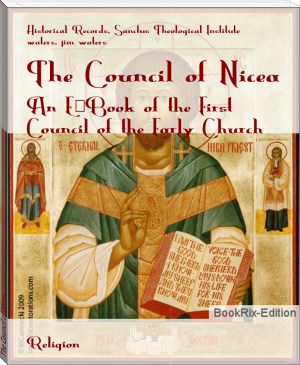Men of the Bible - Dwight L. Moody (crime books to read txt) 📗

- Author: Dwight L. Moody
- Performer: -
Book online «Men of the Bible - Dwight L. Moody (crime books to read txt) 📗». Author Dwight L. Moody
If you are near the kingdom of God now, take the advice of a friend and step into it. Don’t be satisfied with just getting near to it. Christ said to the young ruler, “Thou art not far from the kingdom,” but he failed to get there. Don’t run any risks. Death may overtake you before you have time to carry out your best intentions, if you put off a decision.
It is sad to think that men heard Jesus and Paul, and were moved under their preaching, but were not saved. Judas must many times have come near the kingdom, but he never entered in. I saw it in the army—men who had
ALMOST DECIDEDto become Christians cut down in battle without having taken the step that would have made them sure of eternal life. I confess there is something very sad about it.
In one of the tenement houses in New York city, a doctor was sent for. He came, and found a young man very sick. When he got to the bedside the young man said:
“Doctor, I don’t want you to deceive me; I want to know the worst. Is this illness to prove serious?”
After the doctor had made an examination, he said: “I am sorry to tell you you cannot live out the night.”
The young man looked up and said: “Well, then, I have missed it at last!”
“Missed what?”
“I have missed eternal life. I always intended to become a Christian some day, but I thought I had plenty of time, and put it off.”
The doctor, who was himself a Christian man, said: “It is not too late. Call on God for mercy.”
“No; I have always had a great contempt for a man who repents when he is dying; he is a miserable coward. If I were not sick I would not have a thought about my soul, and I am not going to insult God now.”
The doctor spent the day with him, read to him out of the Bible, and tried to get him to lay hold of the promises. The young man said he would not call on God, and in that state of mind he passed away. Just as he was dying the doctor saw his lips moving. He reached down, and all he could hear was the faint whisper:
“I have missed it at last!“
Dear friend, make sure that you do not miss eternal life at last. Will you go with Herod or with John? Bow your head now and say:
“Son of God, come into this heart of mine. I yield myself to Thee, fully, wholly, unreservedly.”
He will come to you, and will not only save you, but will keep you to the end.
THE MAN BORN BLIND AND JOSEPH OF ARIMATHEAThere were two extraordinary men living in the city of Jerusalem when Christ was on earth. One of them has come down through history nameless—we do not know who he was; the name of the other is given. One was not only a beggar, but blind from his birth; the other was one of the rich men of Jerusalem. Yet in the Gospel of John, there is more space given to this blind beggar than to any other character. The reason why so much has been recorded of this man is because he took his stand for Jesus Christ.
Look at the account given in John ix., beginning at the fifth verse. In the previous chapter Christ had been telling them that He was the Light of the world, and that if any man would follow Him he should not walk in darkness, but should have the light of life. After making a statement of that kind, Christ often gave
AN EVIDENCE OF THE TRUTHof what He said by performing some miracle. If He had said He was the Light of the world, He would show them in what way He was the Light of the world. If He had said He was the Life of the world, He would prove Himself to be such by quickening and raising the dead; just as He did, after telling them that He was the Resurrection and the Life, by going to the graveyard of Bethany and calling Lazarus forth. When Lazarus heard the voice of his friend saying, “Lazarus, come forth!” he came forth immediately.
The Son of God does not ask men to believe Him without a reason for so doing. We need to keep this in mind. You might as well ask a man to see without light or eyes, as to believe without testimony.
He gave them good reason for believing in Him, and proved His Messiahship and authority. He not only told them that He had the power, but He showed them that He had.
These two men, then, were both at Jerusalem. One held as high a position, and the other as low a position, as any in the city. One was at the top of the social ladder, and the other at the bottom. And yet they both made a good confession; and one was as acceptable to Jesus as the other.
IThe man mentioned in this chapter was born blind. We find the Lord’s disciples asking Him:
“Master, who did sin, this man or his parents, that he was born blind?”
Jesus answered, “Neither hath this man sinned, nor his parents; but that the works of God should be manifest in him.”
When He had thus spoken, He spat on the ground, and made clay of the spittle; and He anointed the eyes of the blind man with the clay, and said unto him:
“Go wash in the pool of Siloam.”
The blind man went his way and washed, and his eyesight was restored.
Observe what that man did. He did just what Christ told him to do. The Savior’s command to him was to go to the pool of Siloam and wash; and “he went his way therefore, and came seeing.” He was blessed in the very act of obedience.
Another thought: God does not generally repeat Himself. Of all the blind men who were healed while Christ was on earth, no two were healed in exactly the same way. Jesus met blind Bartimeus near the gates of Jericho, and called him to Him and said:
“What wilt thou that I should do unto thee?”
The answer was: “Lord, that I might receive my sight.”
Now, see what He did. He did not send Bartimeus off to Jerusalem twenty miles away to the pool of Siloam to wash. He did not spit on the ground, and make clay, and anoint his eyes; but with a word He wrought the cure, saying:
“Go thy way; thy faith hath made thee whole.”
Suppose Bartimeus had gone from Jericho and had met the other blind beggar at the gate of the city of Jerusalem, and asked him how it was he got his sight; suppose they began to compare notes—one telling his experience, and the other telling his. Imagine the first saying:
“I do not believe that you have got your sight, because you did not get it in the same way that I got mine.”
Would the different ways the Lord Jesus had in healing them make their cases the less true? Yet there are some people who talk just that way now. Because God does not deal with some exactly as He does with others, people think that God is not dealing with them at all. God seldom repeats Himself. No two persons were ever converted exactly alike, so far as my experience goes. Each one must have an experience of his own. Let the Lord give sight in His own way.
There are thousands of people who
KEEP AWAY FROM CHRISTbecause they are looking for the experience of some dear friend or relative. They should not judge of their conversion by the experiences of others. They have heard some one tell how he was converted twenty years ago, and they expect to be converted in the same way. Persons should never count upon having an experience precisely similar to that of some one else of whom they have heard or read. They must go right to the Lord Himself, and do what He tells them to do. If He says, “Go to the pool of Siloam and wash,” then they must go. If He says, “Come just as you are,” and promises to give sight, then they must come, and let Him do His own work in His own way, just as this blind man did. It was a peculiar way by which to give a man sight; but it was the Lord’s way; and the man’s sight was given him. We might think it was enough to make a man blind to fill his eyes with clay. True, he was now doubly blind; for if he had been able to see before, the clay would have deprived him of his sight. But the Lord wanted to show the people that they were not only spiritually blind by nature, but that they had also allowed themselves to be blinded by the clay of this world, which had been spread over their eyes. But God’s ways are not our ways. If He is going to work, we must let Him act as He pleases.
Shall we dictate to the Almighty? Shall the clay say to the potter, “Why hast thou made me thus?” Who art thou, O man, that repliest against God? Let God work in His own way; and when the Holy Ghost comes, let Him mark out a way for Himself. We must be willing to submit, and to do what the Lord tells us, without any questioning whatever.
“He went his way, therefore, and washed, and came seeing. The neighbors, therefore, and they which before had seen him that he was blind, said, ‘Is not this he that sat and begged?’ ”
“Some said, ‘This is he’; others said, ‘He is like him.’ ”
Now, if he had been like a good many at the present time, I am afraid he would have remained silent. He would have said:
“Well, now I have got my sight, and I will just keep quiet about it. It is not necessary for me to confess it. Why should I say anything? There is a good deal of opposition to this man Jesus Christ. There are a great many bitter things said in Jerusalem against Him. He has a great many enemies. I think there will be trouble if I talk about Him; so I will say nothing.”
Some said, “This is he”; others said, “He is like him.” But he said, “I am he.” He not only got his eyes opened, but, thank God, he got his mouth open too!
Surely, the next thing after we get our eyes opened is for us to open our lips and begin to testify for Him.
The people asked him, “How were thine eyes opened?”
He answered: “A man that is called Jesus made clay and anointed mine eyes, and said unto me, Go to the pool of Siloam and wash: and I went and washed, and I received sight.”
He told a straightforward story, just what the Lord had done for him. That is all. That is what a witness ought to do—tell what he knows, not what he does not know. He did not try to make a long speech. It is not the most flippant and fluent witness who has the most influence with a jury.
This man’s testimony





Comments (0)